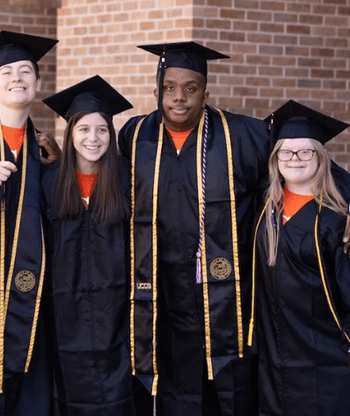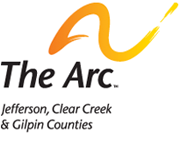Learn About Inclusive Higher Education for Students with IDD
A Q&A with Shayna Laing, Community Engagement Manager at IN! Pathways to Inclusive Higher Education

For many adults, higher education is an important opportunity that opens up a path to the career of their choice. Local nonprofit IN! Pathways to Inclusive Higher Education has been at the forefront of ensuring that students with intellectual and developmental disabilities (IDD) have access to this opportunity here in Colorado. Because of the nonprofit’s efforts, state legislation has been passed to establish inclusive higher education programs, which are now available at eight institutions.
Shayna Laing is the Community Engagement Manager at IN!. Read on to learn more from Laing about what inclusive higher education programs look like, next steps for students with IDD who are interested in college, and more.
Q: How did IN! get started, and how has the organization worked to create inclusive higher education options here in Colorado?
Shayna Laing: We started in 2014 by a group of really passionate parents, advocates, and educators that wanted something more after K-12 for their students with IDD. College was an opportunity for those students across the country but wasn't yet in the state of Colorado, so they banded together to create this initiative to have colleges open their doors for students with intellectual disability. They got state legislation passed in 2016 to fund the first inclusive higher education programs, and then, as an organization, we’ve continued to advocate for continued growth of those programs. Recently, we got 2022 legislation passed for even more money to expand to new programs.
Q: What are inclusive higher education programs, and what do they look like here in Colorado?
SL: Inclusive higher education programs are alternative admission pathways for students with intellectual disabilities to be able to go to college and be fully included. Students in these programs take college coursework alongside their neurotypical peers, and choose an area of study or major that aligns with their career goals. In addition, students receive support in what we call the four pillars. They get academic support, where they pursue a certificate for credit but have access to modifications. They get social support from peer mentors to help them engage across campus and be fully included as any college student would be. They get independent living support, so they'll get some direct instruction on cooking and cleaning and managing life. And then a big piece is career development, as well.
Students aren't going to be earning traditional associate's or bachelor's degrees because they have modified outcomes, but they are earning a certificate that shows they've gone through these courses, engaged with this content, and built skills. It allows them to get beyond those entry-level jobs outside of high school.
Q: Before these inclusive programs were in place, what were some of the barriers that may have prevented someone with IDD from going to college?
SL: I think the biggest barrier was really just perception: Families, students, and educators not perceiving that students with IDD could go to college and continue learning. And so, that was never presented as a pathway for them.
Looking at graduation outcomes for students on IEPs, sometimes with Extended Evidence Outcomes, they're not earning traditional high school diplomas. That can limit them being able to access college or feeling as if they can pursue college.
Another barrier is the need for modifications. At the traditional college level, students can have disabilities, but they have to meet the essential functions of each course. Students can receive accommodations from disability services offices, but a lot of times our students with IDD might require a modification where, instead of writing a five-page paper, they work really hard on one page or put their understanding into a PowerPoint. They're still showing their learning and their cognitive growth, it's just at a different level. These programs are the only way that students with IDD can have those modified outcomes.
Q: How many students have graduated from inclusive higher education programs in Colorado so far?
SL: Since 2016, we have had 88 graduates across the state of Colorado with intellectual disabilities from these programs. And now, with eight programs, we're going to see over 125 students enrolled each year, so that’s really exciting.
Q: For someone with IDD who thinks they might be interested in enrolling in an inclusive higher education program, what would be some good next steps to take?
SL: We would love for students to hear about this early, especially before that transition IEP takes place. But regardless of when you are informed, a big piece is getting your IEP team on board and really having a strong voice as a student to say, ‘I want to pursue post-secondary education.’ Another is advocating for any type of inclusion that they can have even in K-12, like trying to take an academic course inclusively and have support in the course, because that's really what it looks like at these college programs.
More practically, for students and families, our organization facilitates webinars and mentorship programming. When students say, ‘I think I want to do this, but I don't really know what it means,’ they can participate in virtual mentorship with us called the Inspiring Futures College Mentorship Program. We do it every fall and spring, where we hire students that are enrolled in our inclusive higher education programs across the state. We have six sessions over six weeks, and they talk about academics in college, about social life in college, and just explain the power of college inclusion from a student perspective.
To learn more about IN!, click here.
If you would like to learn more about the Inspiring Futures College Mentorship Program, click here. Fall sessions of the program begin September 30.
To learn more about the eight inclusive higher education programs in Colorado, click here.

